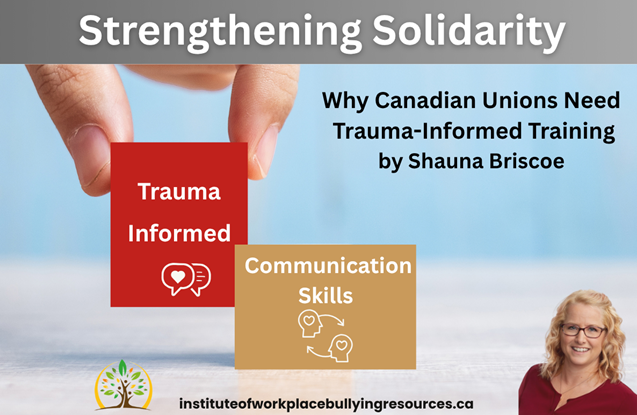Why Canadian Unions Need Trauma-Informed Training
By Shauna Briscoe
Unions have long stood as champions of workers’ rights, fostering solidarity and advocating for fairness in the workplace. But like any organization, unions are not immune to internal challenges—including bullying and intimidation within their own ranks. Addressing these issues isn’t about undermining the labor movement; rather, it’s about strengthening it. If unions truly want to uphold their principles of equity and justice, embracing trauma-informed training is a necessary step forward.
Recognizing the Hidden Struggles
The labor movement is built on the foundation of collective power, yet many union members hesitate to speak up when faced with mistreatment. Union politics can sometimes create tense environments where strong personalities clash, and while healthy debate is essential, intimidation and exclusion have no place in an organization meant to empower its members.
When bullying goes unaddressed, trust erodes, participation declines, and unions risk losing valuable voices in the conversation. Members who feel unsupported may disengage, not because they don’t believe in the movement, but because they no longer feel safe within it. If unions want to maintain strong advocacy, they must ensure that all members feel heard, respected, and valued.
The Role of Trauma-Informed Training
The solution is clear: unions must adopt trauma-informed training as a non-negotiable part of leadership development. This isn’t just about creating better policies—it’s about changing the culture entirely. Union leaders, stewards, and representatives need to understand the psychological impact of bullying, recognize the signs of trauma, and foster environments where members feel safe to voice concerns without fear of retribution.
Empathy-driven leadership isn’t just a nice idea—it’s a necessity. A union that fails to support its members emotionally is a union that fails altogether. Trauma-informed training can help unions shift from a system of punitive action to one of restorative justice, where victims feel heard and toxic behaviors are actively addressed.
Trauma-informed training is not about labeling disagreements as harmful or avoiding difficult conversations. Instead, it equips union representatives with the tools to recognize the impact of bullying, foster healthier communication, and create safer environments where members feel comfortable raising concerns.
By integrating these practices, unions can ensure that all voices—especially those of marginalized or vulnerable members—are uplifted, rather than silenced.
Moving Forward Together
Labor movements thrive when members stand united. Addressing bullying within unions is not about assigning blame but about reinforcing the values that make unions strong: fairness, respect, and collective empowerment. Trauma-informed training offers unions a pathway to build not just better workplaces, but better communities.
If unions want to remain relevant and resilient, they must lead by example—advocating for safe, inclusive environments both within the workplace and within their own ranks. Unions must take proactive steps to become champions of safe and inclusive environments, both within the workplace and their own ranks. Only by addressing the pervasive issue of bullying head-on and adopting trauma-informed practices can unions truly uphold their core values. When every member feels valued, respected, and empowered, the strength of the labor movement is not just preserved, but magnified, paving the way for a future where collective action leads to genuine transformation.
Shauna Briscoe of Manitoba Canada is a certified trauma-informed consultant and trainer with CIWBR.
The Canadian Institute of Workplace Bullying Resources (CIWBR) offers a variety of trauma-informed training sessions customized for each industry, profession, and organization.
Email: psychologicalsafetyfirst@gmail.com


